
Introduction to Keyword Research
1.6 billion live websites (and counting) – that’s how many sites search engines like Google have to sift through every time someone types in a phrase in the search field.
In a matter of seconds, the search engine trawls through millions of websites, collating a list of relevant sites for that person’s consideration. This exclusive, shortlist is referred to as the SERP (Search Engine Results Page) and if you fail to make the cut, you’re out of the game before it even started.
Table of Contents
How do search engines decide what sites to display?
Search engines strive to provide users with the most relevant results possible and with so many websites on the internet, they need to have quite a sophisticated filing system.
When a new website or page is published online, search engines send out clever little bots to crawl through it and figure out what it’s about. They’re looking for typical search terms, or keyword, in the content, so they can file the page away under that term.
When someone then searches for that phrase, the search engine consults its index and displays a list of all the relevant sites. Your website’s position on this list is referred to as ‘ranking’.
What is a keyword?
A keyword is the combination of words people type into search engines to find information e.g. “adidas running shoes” or “SEO specialist Cornwall”.
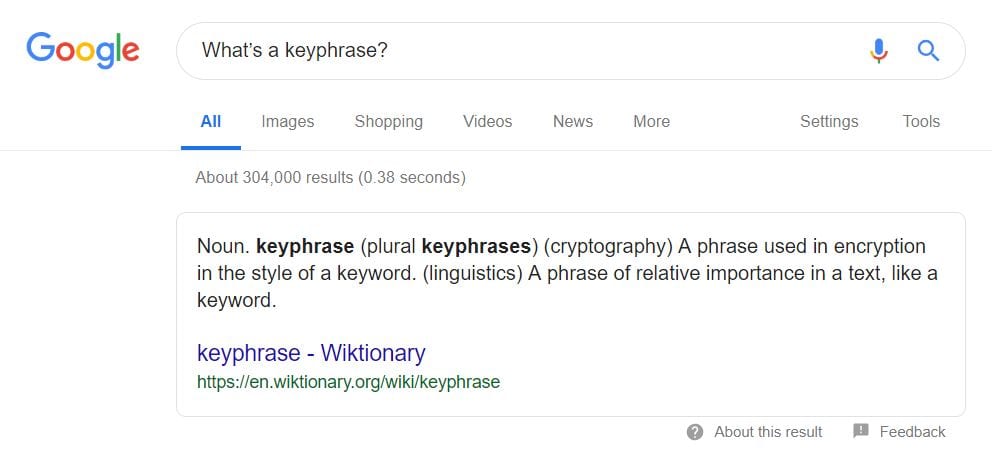
These special phrases are the basis of all organic (unpaid) traffic via search engines and, with Google alone processing over 40,000 search queries every second, it’s critical you’re on the list for the right keyword.
Defining the phrases you want to rank for is known as keyword research, which is an in-depth, vital part of any SEO strategy.
What does keyword research involve?
Keyword research is hugely valuable and can provide significant returns if done correctly. It’s much more comprehensive than simply guessing what your target customers might search for.
Keyword research involves analysing and carefully selecting a set of optimum phrases to ensure your site ranks well, and appears in front of the right people.
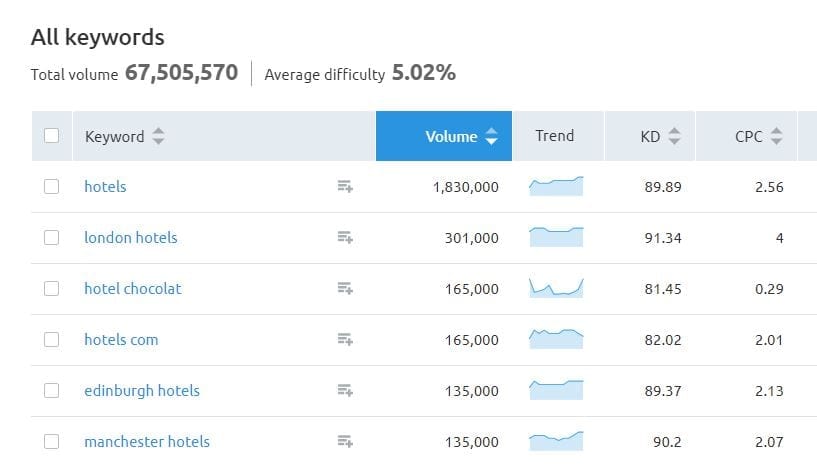
Keyword selection can make or break even a state-of-the-art website, so it’s critical you do your research.
Using specialist tools, each keyword is analysed based on the following metrics:
- Search volume: How many times the keyword is typed into search engines per month.
- Difficulty: How plausible it is to rank for this term. If the first page is dominated by multinationals and news sites, it’s going to be very difficult to compete.
- Relevance: If a term is relevant to your site, company or product offering. For example, “running shoes junior” might be a highly searched phrase, but if your company only sells adult running shoes, it’s not relevant to your business.
- Intent: What are people actually looking for when they use this phrase? Going back to our example, “trainers” is a highly searched phrase, but people could be looking for running shoes, personal trainers, fitness equipment, dog trainers to name just a few. If you’re selling running shoes, there is little value in ranking for this term as, even if it brings traffic to your site, the conversion will be low as a percentage of your visitors weren’t looking for running shoes in the first place.
Another reason it’s important to analyse user intent is to capture traffic at different stages of the buying cycle. Someone searching for “women’s tops” is probably just researching, whereas someone looking for “’women’s black tops size 10” is ready to buy. Content can be developed to capture traffic from both these routes.
Choosing the right keyword
To create that all-important list of keyword you want to rank for, you need a holistic approach.
Firstly, you need to understand your current position. What do you rank for and what’s the search volumes of these terms? Are these the most relevant keyword? It’s important to understand whether you need to improve your rank or change the keyword focus of your content.
You also need to look at your competitors to understand what they rank for. If they rank for the same phrases as you but higher, you can benchmark their content to decide if yours could be improved. If they’re ranking for different phrases, you need to understand the search volume, relevance and intent associated with those phrases as they might represent new sources of traffic for your site.
Above all, you need to get inside the head of your target consumer, trying to anticipate what they might look for and what language they could use.
At each stage of the buying cycle, people will be searching for different things. If you put yourself in their shoes, preempting what they’re looking for, you can use these keyword to open up new traffic streams to your site.
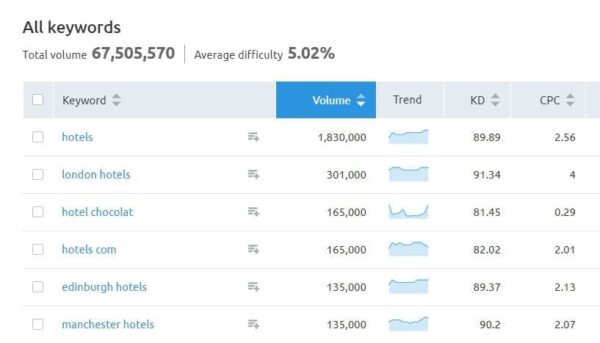
You also need to analyse the language people use. Your keyword should cover related words and synonyms e.g. running shoes, trainers and sneakers even, so that you capture all of that relevant traffic.
It’s also important to understand if search trends have changed over time. What’s the current way of referring to something? For example, people don’t just search for “holidays” nowadays. They look for “getaways”, “mini-breaks” and “babymoons”.
Short tail keyword
Short tail keywords, also known as “broad” or “generic” keywords, are short phrases that consist of one or two words. They are typically more general and less specific than long tail keywords, which are longer and more specific phrases.
For example, a short tail keyword might be “dog toys,” while a long tail keyword might be “indestructible rubber dog toys for aggressive chewers.”
Short tail keywords are often searched for more frequently than long tail keywords, as they are more general and therefore attract a wider audience. However, they are also more competitive, as more websites are likely to be targeting them.
-
They are easier to rank for: Because short tail keywords are less specific, it is generally easier to rank for them in search engine results pages (SERPs).
-
They can drive more traffic: Short tail keywords are typically searched for more frequently, so targeting them can lead to more traffic to your website.
-
They are more cost-effective: Short tail keywords are generally less expensive to bid on in paid search campaigns, as they are less specific and therefore less in demand.
Despite these advantages, it is important to use short tail keywords carefully. If you rely too heavily on them, you risk attracting a large volume of irrelevant traffic to your website. It is often more effective to use a combination of short tail and long tail keywords to attract a targeted and qualified audience
Long tail keyword
The highest volume keyword online are generally 1-2 word terms like “trainers”, “running shoes” or “SEO”. It’s easy to be seduced by the volume of searches, but these broad, generic terms are highly competitive and have a relatively low conversion rate. The good news is, they actually only make up about 30% of the searches performed online.
The other 70% of searches are for more specific terms like “ladies hoodies size 12”, and there’s a lot more value in focussing on these keyword as they capture people further into the buying cycle when they are preparing to buy. The more specific the keyword, the more likely you are to convert, although the search volume will be lower.
What’s more, as these keyword are more specific, there’s less competition in the SERP and it’s much easier to rank.
Research suggests that click-through rates are higher for long tail keyword too, as they allow search engines to show more relevant results.
Keyword Intent
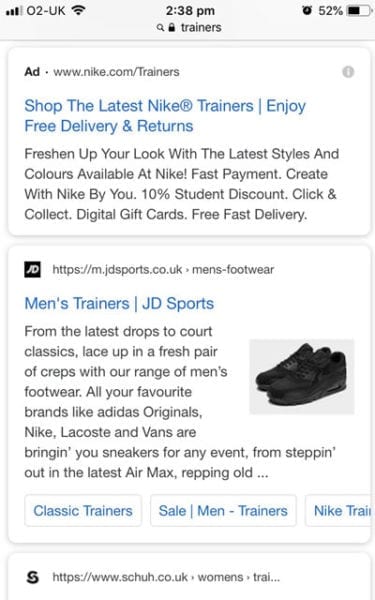
Keyword intent refers to the purpose or goal of a particular keyword search. Understanding keyword intent can be crucial for businesses and organizations, as it can help them create content that is more relevant and valuable to their audience.
Informational Keywords
These keywords are used by people who are looking for information or answers to a question. For example, someone searching for “how to train a dog” is likely looking for informational content.
Navigational Keywords
Individuals who use keywords to search for a specific website or webpage, like “BBC News,” are probably attempting to navigate to that site.
Transactional Keywords
Keywords used by people with the intention of making a purchase, such as “order pizza delivery,” often indicate a desire to transact.
Commercial Keywords
Keywords that are used by individuals who are considering making a purchase but still want to gather more information, like “compare car insurance quotes,” typically suggest that the user is conducting commercial research
Identify relevant keywords
Identifying relevant keywords is a crucial step in the process of search engine optimization (SEO) and content marketing. By choosing the right keywords, you can increase the chances that your website will rank highly in search engine results pages (SERPs) and attract qualified traffic. There are a variety of tools and strategies that you can use to identify relevant keywords, including keyword research tools, analyzing search data, looking at your competitors’ keywords, and using customer feedback. It is important to choose keywords that are both relevant to your business or organization and that have a sufficient search volume to attract a meaningful amount of traffic. By carefully selecting and targeting relevant keywords, you can effectively drive traffic to your website and attract qualified leads.
Keyword Search Data Analysis
Analyzing search data is a useful way to determine the relevance of a particular keyword. One way to do this is to look at the number of searches for the keyword. Keywords with high search volume are typically more competitive, but they may also be more valuable if they attract a large audience. On the other hand, keywords with low search volume may be less competitive, but they may also be less valuable if they attract a smaller audience. In addition to looking at search volume, it is also important to consider the relevance of the keyword to your business or organization. A keyword may have high search volume, but if it is not relevant to your products or services, it may not be worth targeting. By carefully analyzing search data, you can identify keywords that are both relevant and have a sufficient search volume to be worth targeting.
Step-by-step: how to Analysing search data
-
Identify the keyword or phrase that you want to analyze. This could be a keyword that you are already targeting, or one that you are considering targeting in the future.
-
Use a keyword research tool to retrieve search data for the keyword. Some popular tools include the Google Keyword Planner and Ahrefs.
-
Look at the search volume for the keyword. This will give you an idea of how frequently the keyword is being searched for. Keywords with high search volume are typically more competitive, but they may also be more valuable if they attract a large audience.
-
Consider the relevance of the keyword to your business or organization. A keyword may have high search volume, but if it is not relevant to your products or services, it may not be worth targeting.
-
Look at the level of competition for the keyword. This will give you an idea of how difficult it will be to rank for the keyword in search engine results pages (SERPs).
-
Use this information to determine whether the keyword is worth targeting. If the keyword has a high search volume, is relevant to your business, and has a manageable level of competition, it may be worth including in your SEO and content marketing efforts.

Competitor Keyword Analysis
Analyzing your competitors’ keywords can be a valuable strategy in the process of identifying relevant keywords for your business or organization. By looking at the keywords that your competitors are targeting, you can get a sense of what is working for them and identify opportunities to differentiate yourself. There are several ways to analyze your competitors’ keywords, including using keyword research tools, analyzing their website and content, and looking at their paid search campaigns. By understanding the keywords that your competitors are targeting, you can get a sense of the language and phrases that are most important to your industry and use that information to inform your own keyword selection. It is important to keep in mind, however, that your competitors’ keywords may not always be relevant to your business, so it is important to also consider the relevance and value of any keywords that you identify.
-
Keyword research tools: Many keyword research tools, such as the Google Keyword Planner and Ahrefs, allow you to enter a competitor’s website and see the keywords that they are ranking for. This can give you a sense of the language and phrases that are most important to your industry.
-
Website and content analysis tools: Tools like SEMrush and Moz allow you to analyze a competitor’s website and content to see which keywords they are using. These tools can also provide insights into a competitor’s organic traffic and search engine rankings.
-
Paid search analysis tools: If your competitors are running paid search campaigns, you can use tools like SpyFu and AdWords Performance Grader to see which keywords they are targeting. This can give you a sense of the keywords that are driving traffic and conversions for them.
The importance of keyword research

Keyword should be at the core of all your digital marketing. That’s how people look for businesses, products and information at all stages of the buying cycle, so if you’re not using them correctly you can’t drive traffic, online sales or return on investment.
With the right keyword research, you can optimise your content to ensure you rank highly in the SERP and have a better chance of getting a click-through. It also highlights areas for content development in the form of new pages on your website or blog posts so that your site can rank for a wider range of keyword and capture more traffic.
It also means the traffic you get is better quality and more relevant. Giving you the best possible chance of conversion.

Moreover, keyword research is actually market research. In order to do it well, you need to extensively examine your own position, your competitors’, the market and your target consumer. This level of analysis can quite often highlight opportunities for development and give you an insight into consumer demands. For example, you can see who is the most searched for brand and benchmark yourself against them. Or if you notice you don’t sell the top searched for product, you could adapt your offering.
Knowing the top ranking players in the SERP can also spark ideas for collaboration and highlight backlinks providers, which are also critical SEO strategies.
Keyword research shouldn’t be underestimated. It’s actually one of the most important steps to any online marketing, particularly SEO, and it’s not as simple as it first seems. To do it well takes a combination of specialist tools, industry experience and tested methods.
Solve-ing your SEO through keyword research
At Solve, we want our clients to succeed, and the success of any SEO strategy depends on the quality of the keyword research. Our specialist team of geeks and geekesses use a combination of market-leading tools, proven experience and a little Solve magic to ensure all of our activities are based on thorough keyword research. And our methods really work – we’ve improved the ranking for hundreds of businesses, some by as much as 25,000%! But don’t just take our word for it, check out what our previous clients say on Google.
If you need help to solve your SEO, get in touch to see how we can help.

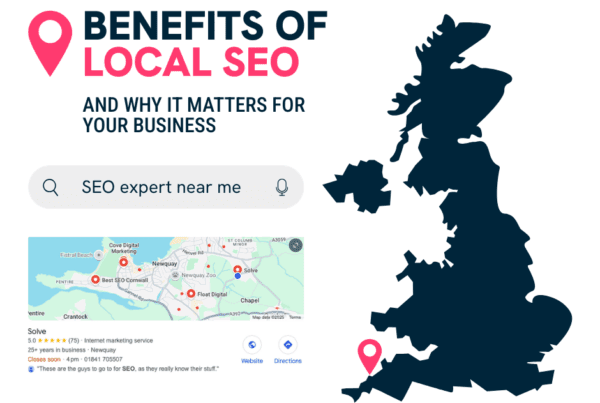




I didn’t realise that there is so much to consider about keyphrase research! Thanks for sharing!
Hi Jim, thanks for the comment. It’s crazy how much effort goes into this ‘mico publishing’. When we perform this keyphrase research, it typically takes us 1-2 days!